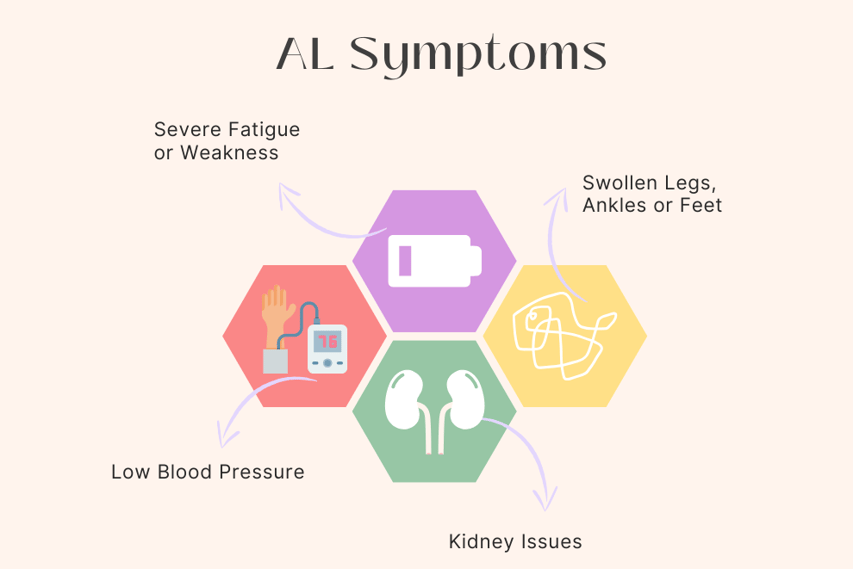1. AL (Primary) Amyloidosis
This type is the most common and typically affects the heart, kidneys, nerves, and gastrointestinal system. Symptoms include:
Heart (Cardiac Amyloidosis):
Irregular heartbeats (arrhythmias)
Heart failure (shortness of breath, fluid retention, swollen legs)
Low blood pressure or fainting
Kidneys:
Protein in the urine (proteinuria)
Swelling in the legs, feet, and ankles
Kidney failure, leading to increased blood urea nitrogen (BUN) and creatinine levels
Nervous System:
Peripheral neuropathy (numbness, tingling, pain in hands and feet)
Carpal tunnel syndrome
Autonomic neuropathy (dizziness, lightheadedness, bowel or bladder issues)
Gastrointestinal System:
Diarrhea or constipation
Difficulty swallowing (dysphagia)
Weight loss
2. AA (Secondary) Amyloidosis
This form occurs due to chronic inflammatory diseases like rheumatoid arthritis or chronic infections. It mainly affects the kidneys, liver, and spleen. Symptoms include:
Kidneys:
Proteinuria (protein in the urine)
Swelling in the lower extremities due to nephrotic syndrome
Kidney failure (in severe cases)
Liver:
Enlarged liver (hepatomegaly)
Abnormal liver function tests (though symptoms are often mild)
Spleen:
Enlarged spleen (splenomegaly)
Gastrointestinal System:
Diarrhea, sometimes with malabsorption issues
3. Hereditary Amyloidosis (Familial)
This type is linked to genetic mutations and can affect the heart, nerves, liver, or kidneys. Symptoms vary depending on the mutation but can include:
Heart:
Similar to AL amyloidosis with symptoms of heart failure
Arrhythmias and heart block (delayed or interrupted electrical signals in the heart)
Nerves:
Peripheral neuropathy (pain, numbness, weakness in the limbs)
Autonomic dysfunction (dizziness, digestive issues, sexual dysfunction)
Kidneys:
Proteinuria and kidney dysfunction
Eyes:
Eye discoloration or vision changes
4. Wild-type (Senile) Amyloidosis
This form mostly affects elderly individuals and tends to impact the heart. Symptoms often resemble those seen in AL amyloidosis:
Heart:
Heart failure (shortness of breath, fluid buildup)
Fatigue and weakness
Arrhythmias
Thickening of the heart walls, which makes it harder for the heart to pump blood
Tendons and Ligaments:
Carpal tunnel syndrome (caused by amyloid deposits in the wrist)
Joint stiffness or pain
Common Symptoms Across All Types
Fatigue
Weight loss
Swelling (due to fluid retention)
Enlarged tongue (macroglossia), especially in AL amyloidosis
The specific symptoms will depend largely on which organs are involved, but fatigue, organ failure, and fluid retention are often universal signs as amyloid builds up and disrupts normal function.




Severe Fatigue & Exhaustion






Shortness of Breath
Low Blood Pressure
Water Retention






Kidney Issues
Swollen Tongue
Purpura
